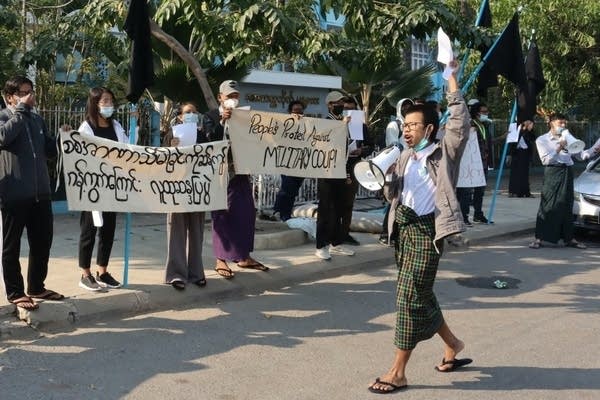After Myanmar coup, Karen refugees in Minn. fear for homeland

Go Deeper.
Create an account or log in to save stories.
Like this?
Thanks for liking this story! We have added it to a list of your favorite stories.
Fifteen years ago, Tu Lor Eh Paw’s family left their small village in Burma, now known as Myanmar, seeking a better life away from political violence and unrest.
Part of her family fled first to Thailand and then to Minnesota in 2011, while others stayed behind.
Paw, a student at Bethel University, has been closely watching this week’s news of a coup in Myanmar, in which the military seized power and detained many of the country's leaders.

"I just don't know what's going on with my family that's left over there,” she said. “I feel very uneasy, and not having any type of communication with my aunts and uncles, and brother and sisters. It's hard."
Turn Up Your Support
MPR News helps you turn down the noise and build shared understanding. Turn up your support for this public resource and keep trusted journalism accessible to all.
Minnesota is home to one of the country's largest concentrations of the Karen, an ethnic group in Myanmar, who decades ago fled political violence and persecution. Now, they're seeing history repeat itself.
According to the Karen Organization of Minnesota, there are more than 17,000 Karen people living in the state, along with smaller numbers of refugees from other ethnic groups in Myanmar, including Karenni and Mon.
News of the military coup and the detention of de facto leader Aung San Suu Kyi spread quickly through the community.
"It just brings a lot of traumatic memory back to the generation that is growing up right now,” said Hsajune Dyan, an assistant principal at Washington Technology Magnet School in St. Paul, which many Karen students attend.

Dyan was about 6 years old the last time the military seized control of his home country of Burma in 1988. He grew up in refugee camps until he was 17, when his family came to Minnesota.
Dyan said the coup shocked many people because over the past decade, the civilian government in Myanmar has co-existed with the military under quasi-democratic rule.
"I did not want to believe that they would have the guts to take over,” he said.
Two years ago, Dyan returned to Myanmar for a visit. He knows it’s an opportunity not likely to happen again soon. Military leaders have cut phone and internet lines, and suspended flights in and out of the country.
"They want to like, control and close the country and not to let anyone share the news,” Dyan said. But people in Myanmar are finding ways to share news through social media posts and live videos, he said.
When Eh Soe Dwe heard the news of the coup, it felt all too familiar. Dwe was born in Myanmar in 1997, during the ongoing civil conflict between the military and her Karen people.
When she was 4, her father was arrested and interrogated by a Burmese soldier because he had worked as a human rights activist and reporter. Her family sold their land and escaped to Thailand. They came to the United States as refugees in 2004 and settled in Maplewood.
Several years later, their hopes for harmony and peace in their homeland rose, as Myanmar’s pro-democracy party won election and the country appeared to be on a path to reform. But that peace was short-lived, said Dwe, who's now 23 and a recent graduate of Augsburg University.
“The Burmese oppression and genocide against the Karen people and other ethnic minorities, of course, never really went away,” she said. “It was just hidden.”

This week, Dwe and her family members have been anxiously watching news of the latest chaotic developments in their homeland.
"It really complicates the livelihoods of our family back home,” she said. “And that has caused a lot of anxiety and fear across the Karen community here in Minnesota."
Many in Minnesota worry what will now happen to the Karen people and other ethnic groups in Myanmar.
Paw said she's frustrated that the recent coup has drawn widespread media attention, while she believes the ongoing plight of the Karen and other ethnic groups in Myanmar — including the military burning villages — has been largely ignored.
"A lot of people are running, and a lot of them are children and women,” she said. “I feel like I'm seeing history repeating itself."
Members of Minnesota's Karen community are doing what they can to show solidarity with their home country. Some are writing letters to members of Congress, asking the U.S. government to condemn the coup.

“We want the international countries to pay attention and do something about this military dictatorship,” said Eh Tah Khu, executive director of the Karen Organization of Minnesota. “Because if this country goes back under military dictatorship, it’s going to be very hard for the people who are living inside Burma.”
Some members of the Karen community plan to travel to Washington, D.C. this weekend for a demonstration to raise awareness of the situation.
In the meantime, they'll keep watching the news and trying to reach out to loved ones in a country whose prospects for peace seem once again uncertain.



